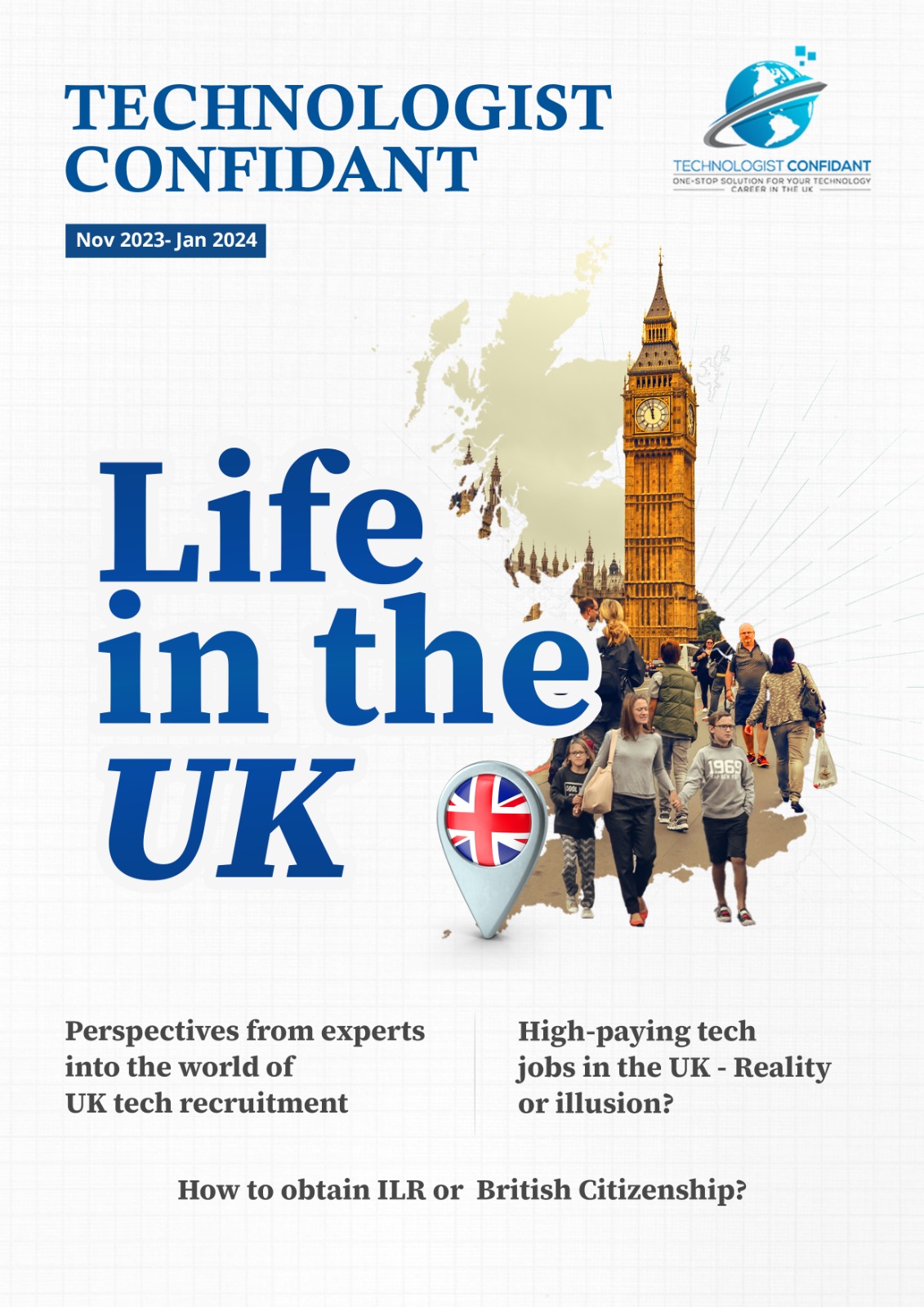A recent government-backed analysis demonstrates how the UK is evolving into a tech economy, with plenty of employment and pay prospects. Tech hiring has reached record levels in the last five years due to the quick uptake of digital technology and the sector's increasing prosperity. UK tech companies anticipate growth in staff, sales, and investments for 2022, but they urge the government to boost innovation.
According to recently released data, there were around 870,000 technology and digital job openings in the UK between January and May 2022 due to a surge in demand for tech-related goods and services. According to the statistics, which was gathered by job search firm Adzuna and examined by Tech Nation on behalf of the UK's Digital Economy Council (DEC), tech roles now account for 14 per cent of job openings in the nation, up from 11 per cent just before the pandemic.
In addition, hiring is still 42 per cent higher than in 2021, despite a modest decrease in the number of open positions over the past month. This is because the job market is racing to keep up with the UK's tech ecosystem, which is now the third-largest in the world after raising £12.4 billion in venture capital funding so far this year and ranking cities like Bristol, Oxford, and London among the top European tech hubs for financing.
Present figures
According to accountancy and consultancy firm RSM, the UK's tech industry is still expanding and raising pay despite the poor economic prospects. According to Office for National Statistics data, the number of job openings in the technology and communication sector rose to 76,000 in the first quarter of 2022 from 69,000 in the final quarter of 2021, a 10 per cent increase. According to estimates by CompTIA, 14,959 new technology jobs might be created in the UK in 2022 alone. Moreover, the UK's tech industry has gained an average of 10,356 new roles over the last five years, which is more than the yearly average.
The new information was released in a thorough analysis by Tech Nation, an organisation supported by the government, which states that there are now nearly 5 million people employed in the digital tech economy, up from 2.18 million in 2011. The fact that this number has increased from just under 3 million in 2019 underscores the structural changes the UK economy has undergone due to the COVID-19 epidemic. The Tech Nation statistics make it abundantly evident that the UK's private sector and governmental institutions should support the tech and digital economy as it expands. Over 2 million tech jobs were advertised during the past year, surpassing any other sector of the UK labour market. Positions in this tech industry currently make up about 14 per cent of the workforce in the country. According to Tech Nation, the employment surge reflects the growth in venture capital investments made in UK tech companies in 2021, which increased by 130 per cent to just below $41 billion. This is also being supported by the economy's increased adoption of tech jobs.
What hiring will look like in the present scenario
According to data from CompTIA, 48.4 per cent of the 1,978,041 persons engaged in UK technology in 2021 are employed in non-technical businesses and industries. Additionally, it was discovered that 31 per cent of those employed in the technology sector work in positions like sales, marketing, and human resources that support and enhance the operations of tech companies without necessarily requiring a background in technology.
More than 36 per cent of jobs in the digital tech industry, according to Tech Nation, are in non-technical fields, including product management, user experience, people, and sales. A little over 36 per cent of jobs are non-technical, while another 33 per cent are technical but not in the tech industry. Additionally, during the past year, the number of tech job openings has climbed monthly, from 145,000 opportunities advertised in May 2021 to 181,000 roles as of May 2022.
Large software and professional services firms based in the US are setting the standard for IT job listings, including IBM, Oracle, and Amazon. Ocados, a "UK decacorn," is third in the ranks for hiring in the UK, having posted over 33,500 jobs last year. The survey cites data and architecture as the two most in-demand tech talents, with demand for each increasing by over 100 per cent between 2019 and 2021. In addition, 300,165 persons in the UK held IT analyst, cyber security, and systems-related occupations in 2021. According to CompTIA, this number will rise by +0.7 per cent in 2022.
Job openings are increasing, and salaries are rising faster than the rest of the economy. In the UK, the average wage for IT employment is £62,000 compared to £35,000 for non-tech jobs, representing an increase of 80 per cent over non-tech professions.
The startup environment fostering increased employment prospects
Numerous attendees flocked to the UK city at London Tech Week 2022, which took place from June 13 to June 17. Critical data on the state of investment in the tech sector were released during London Tech Week by Dealroom and Tech Nation, showing that so far in 2022, investment in UK tech companies has remained resilient despite the general economic unpredictability, with the UK outperforming most of their international competitors in a number of metrics.
UK start-ups raised $11.3 billion in Q1 2022, compared to $7.9 billion in Q1 2021, making it the largest yearly opening in start-up investment history. This was mostly due to a noticeable rise in larger agreements (those between €100M and €250M).
The UK leads all major European markets in startup funding with $15.6 billion, placing second only to the United States so far in 2022. It also ranks ahead of China and India for the first time.
With $11.3 billion invested so far in 2022, London is the largest centre in Europe for startups. However, Bristol and Oxford are also listed among the top 20 hotspots for new businesses in Europe, in addition to London.In terms of the development of billion dollar tech companies, the UK leads all of Europe with 122 unicorns, trailing only the US and China. A total of 248 prospective unicorns with a worth of more than $250 million located in the UK.
With 8.5M unfilled positions over the past year, the need for people in the UK technology sector is higher than ever in 2022. With an average tech salary of £75,278 in London, the city comes in second place internationally for tech salaries relative to cost of living. In the UK, the average wage for tech occupations is currently 65 per cent more than that of non-tech economic jobs, at £58,000 as opposed to £35,000.
Challenges and the way forward
Tech Nation's study does contain some legitimate cautions that the UK needs to take to ensure that the opportunities being seen are egalitarian, despite all the encouraging signs in the tech and digital sector. For instance, only 26 per cent of people in the UK feel that learning a technology skill will enable them to attract greater pay, indicating that knowledge of the chance to earn more is low nationwide.
Additionally, a significant share of senior leaders are highly qualified people. 74.6 per cent of those who include this information in their profiles hold a bachelor's degree, and 46.3 per cent have a master's degree. What's more, it's particularly intriguing that the best educational institutions in the world are at the top of the list for C-suite education in the technology industry, exposing a potentially precarious situation. The Universities of Cambridge and Oxford are at the top of the list for educational institutions, which account for a combined 4.6 per cent of educational experiences. Nevertheless, only 1 per cent of UK students are accepted into Oxford and Cambridge, respectively.
Most tech companies surveyed by the trade association techUK anticipate rising sales, investments, and staff in 2022. This indicates that the UK's technology sector is enthusiastic about the future. However, the questioned companies urged the government to prioritise funding for R&D and innovation above access to overseas talent and improved training to assist them to realise their goals. Despite the uncertainties, more than 50 per cent of the survey respondents' companies said they intended to expand their investment plans, and almost 70 per cent said they intended to increase their personnel based on this year's results. Businesses also reported a strong optimism about their future intentions for investments in the UK and expanding their businesses.






